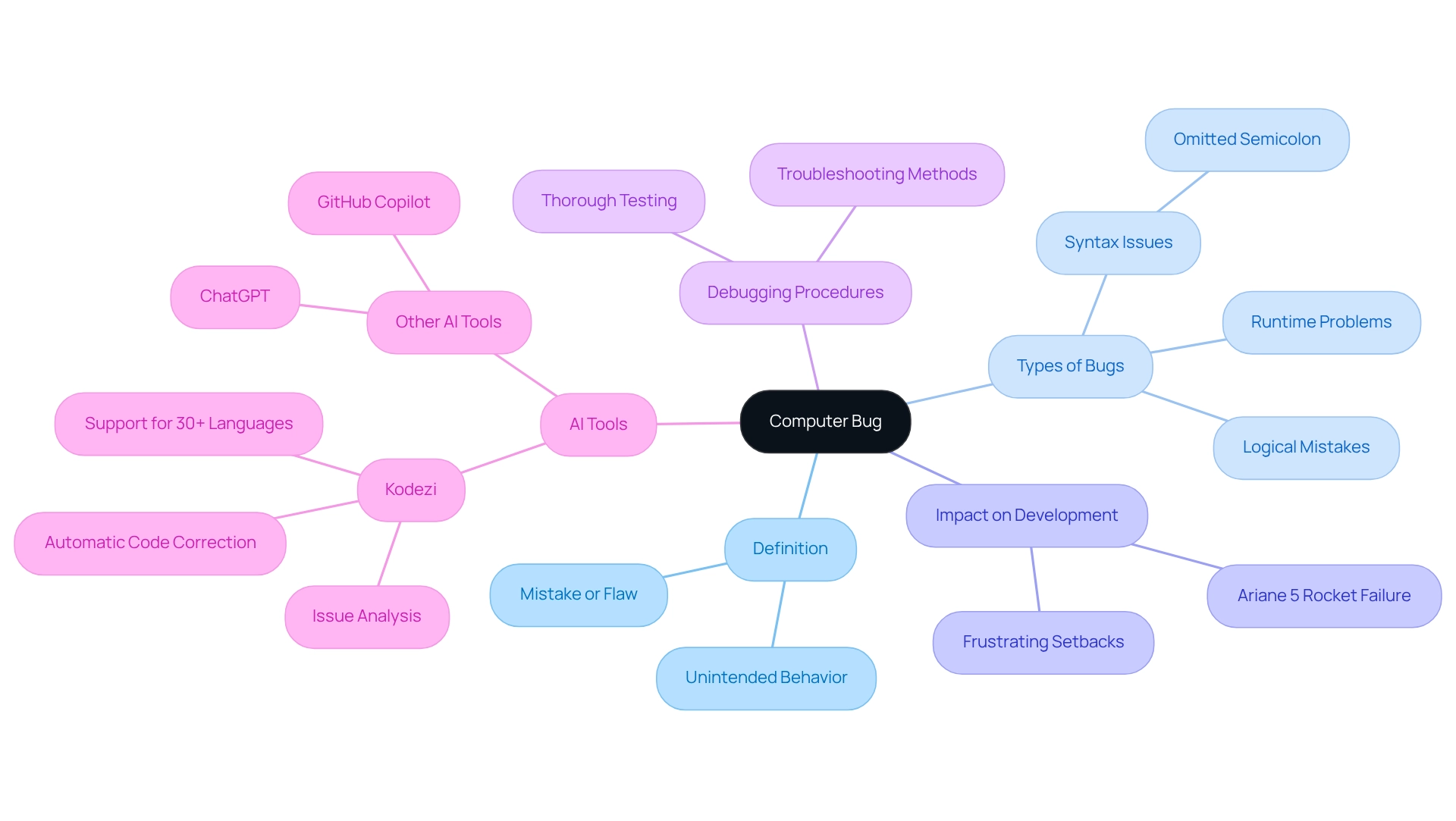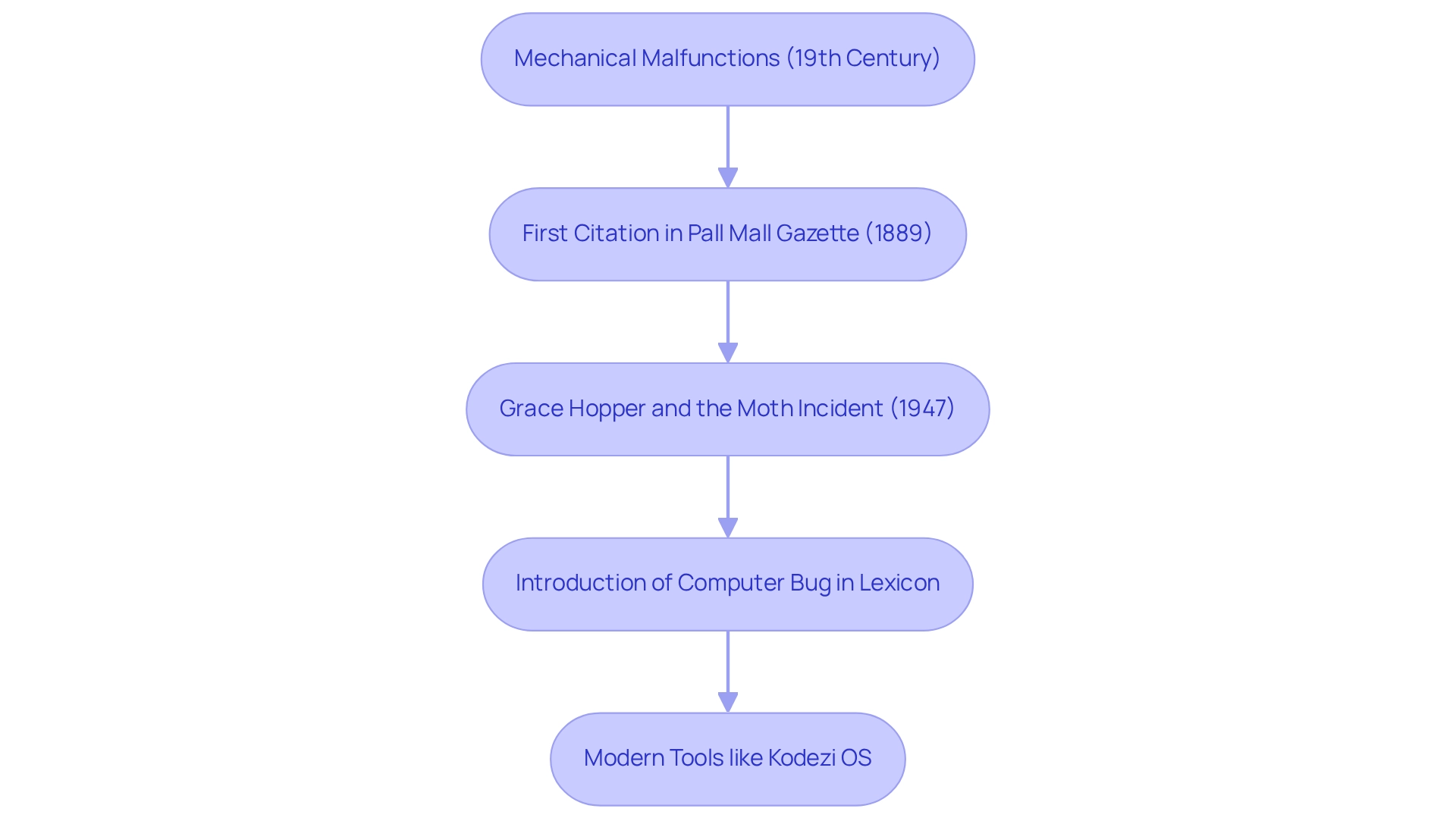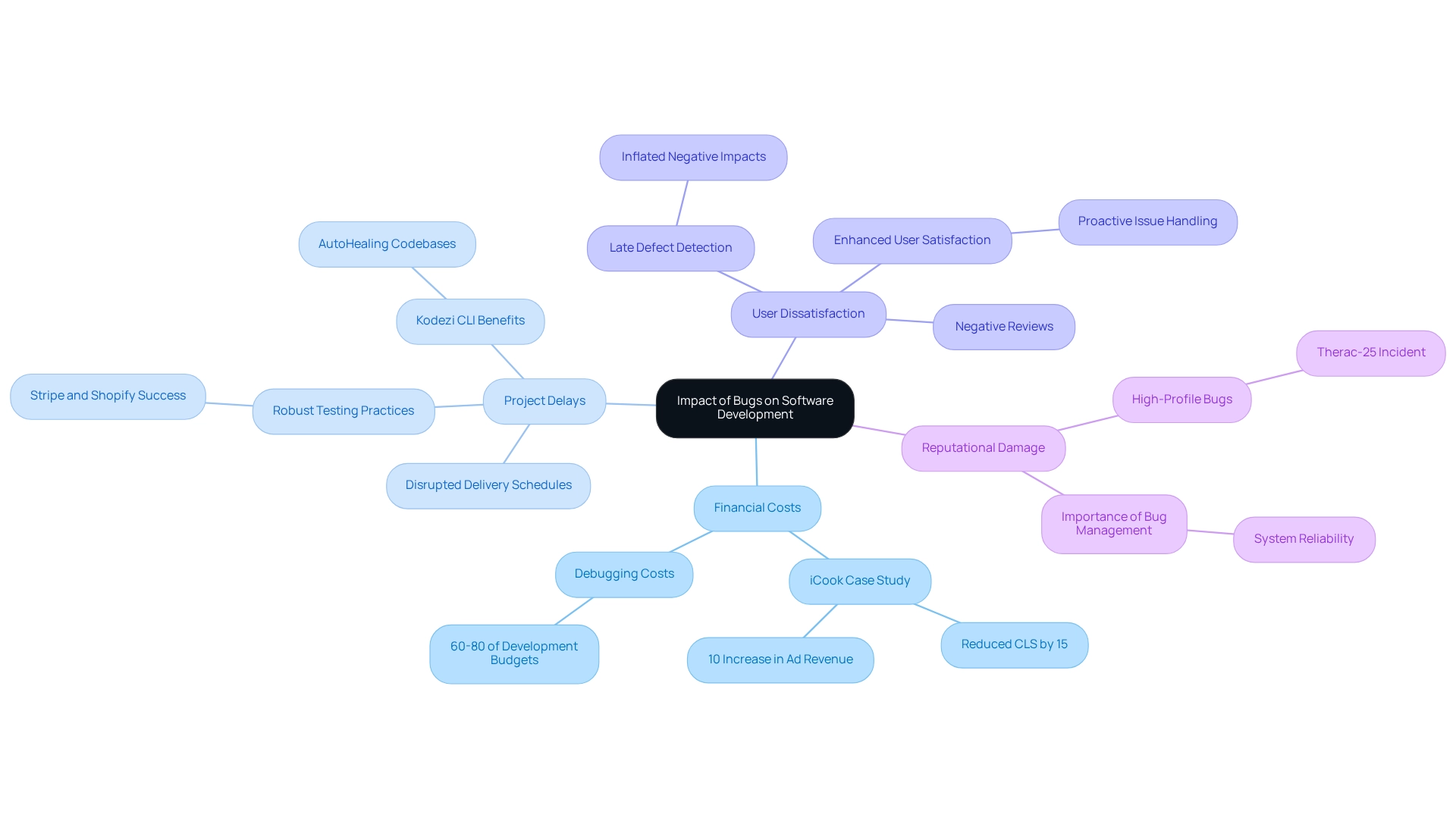Overview
Coding challenges can be daunting for developers, often leading to frustrating errors known as computer bugs. A bug is defined as an error, flaw, or unintended behavior in a computer program that results in incorrect outcomes. These bugs can take various forms, including syntax errors and security vulnerabilities, and their historical context underscores their significance in software development.
Furthermore, the impact of bugs on development is substantial. They can lead to financial costs, project delays, and user dissatisfaction, highlighting the essential need for effective debugging tools. This is where Kodezi comes into play. Kodezi addresses these challenges head-on, offering features designed to enhance code quality and reliability.
In addition to improving code quality, Kodezi significantly boosts productivity. By streamlining the debugging process, it allows developers to focus on creating innovative solutions rather than getting bogged down by errors. Imagine the efficiency gains when you can quickly identify and resolve issues in your code!
If you're looking to elevate your coding practices, explore the tools available on the Kodezi platform. With its user-friendly interface and powerful debugging capabilities, Kodezi is poised to transform your approach to software development. Don't let bugs hold you back—embrace the tools that can help you code with confidence.
Introduction
In the intricate world of software development, coding challenges are a common hurdle that developers encounter regularly. How can these challenges be effectively managed? Enter Kodezi, a tool designed to revolutionize the debugging process with its innovative features. By streamlining the identification and resolution of computer bugs, Kodezi not only enhances productivity but also significantly improves code quality.
Understanding the nature of computer bugs—ranging from minor syntax errors to critical security vulnerabilities—is essential for developers and engineers alike. Furthermore, as technology evolves, so do the tools created to combat these issues. Kodezi stands out by offering solutions that address these challenges head-on, making it an invaluable asset in the software development toolkit.
The benefits of using Kodezi are clear: it empowers developers to produce higher-quality code more efficiently, ultimately leading to more reliable software. Are you ready to explore the tools available on this platform? This article delves into the core concepts surrounding computer bugs, traces their historical origins, classifies their types, and examines the profound impact they have on software development, offering insights into effective management strategies that can enhance code quality and reliability.
Define Computer Bug: Core Concepts and Terminology
Coding challenges are an inherent part of software development, often leading to frustrating setbacks for developers. A bug computer definition refers to a mistake, flaw, or unintended behavior in a computer program that results in incorrect or unforeseen outcomes. Bugs can manifest in various forms, including syntax issues, logical mistakes, and runtime problems. The bug computer definition has become synonymous with any defect in computer programs, encompassing a wide range of issues that can affect the functionality and performance of an application. Grasping the bug computer definition is crucial for developers and engineers, as it underscores the significance of thorough testing and debugging procedures to guarantee reliability. For instance, a frequent syntax mistake occurs when a developer omits a semicolon at the conclusion of a statement, leading to compilation errors. This highlights how even minor oversights can have major repercussions in application development. Furthermore, debugging procedures are essential for ensuring system reliability.
With the rise of AI tools like Kodezi, which autonomously enhances codebases and resolves issues before they reach production, the landscape of software debugging is evolving. Kodezi distinguishes itself by functioning as an autocorrect for code instead of merely an autocomplete tool. This innovative platform enables users to automatically debug and resolve coding problems. It supports over 30 programming languages and is currently compatible with Visual Studio Code (Vscode), with plans to expand support to more IDEs in the future.
Kodezi's capabilities in automatic code correction and issue analysis significantly enhance the debugging process. By predicting common errors and providing insights, it leads to more efficient identification of root causes and improved code quality. Understanding the bug computer definition and its consequences is essential for application developers and engineers, as it underscores the importance of thorough testing and troubleshooting methods. Explore the tools available on Kodezi to elevate your coding practices and experience the benefits of improved productivity and code quality.

Trace the Origins of Computer Bugs: Historical Context
The bug computer definition originates from the early days of engineering, where it was used to describe mechanical malfunctions dating back to the 19th century. Notably, computer scientist Grace Hopper popularized the bug computer definition in 1947 when a moth was discovered causing a malfunction in the Harvard Mark II computer. This incident not only brought the bug computer definition into the computing lexicon but also highlighted the persistent challenges engineers face in diagnosing and rectifying faults within complex systems. Furthermore, historical references indicate that the bug computer definition, referring to an obstacle or issue, has been part of engineering language for over a century. The earliest citation can be found in the Pall Mall Gazette in 1889, describing an issue encountered by Thomas Edison. This long-standing history emphasizes that the effort to uphold functional and efficient systems is not a recent occurrence; it is a challenge that persists in today's development landscape.
In addition, the evolution of the term illustrates the continuous need for effective solutions to handle and reduce issues. This is where tools like Kodezi OS come into play, concentrating on preserving code quality and scalability. By utilizing Kodezi, developers can address common coding challenges, improve productivity, and enhance the overall quality of their code. Have you considered how such tools could streamline your development process? Explore the features available on Kodezi, and see how they can transform your coding practices.

Identify Types of Computer Bugs: Classifications and Examples
Coding can present numerous challenges for developers, particularly when it comes to identifying and resolving issues related to the bug computer definition. These bugs can be classified into several key categories, each with distinct characteristics and implications for software development:
- Syntax Errors: These mistakes violate the rules of the programming language, often flagged by compilers. For instance, misspelling keywords in C can lead to syntax issues during compilation, preventing the code from executing.
- Logical Flaws: These defects arise when the program's logic is incorrect, resulting in unexpected results despite the code running smoothly. Such mistakes can be especially challenging to identify, as they do not lead to immediate failures. An automated debugging system can assist in pinpointing these logical inconsistencies, ensuring the code functions as intended.
- Runtime Errors: These errors occur during program execution, usually due to unexpected conditions, such as division by zero. They can disrupt the application's flow and lead to crashes or unresponsive behavior. Tools can swiftly identify these problems, reducing downtime.
- Performance Bugs: These issues cause software to operate slower than anticipated, adversely affecting user experience. For example, inefficient algorithms can lead to significant delays in processing time, which is critical in high-demand applications. The automated code debugging feature can promptly identify and resolve performance bottlenecks, ensuring optimal application performance.
- Security Bugs: Vulnerabilities in the code that can be exploited by malicious actors pose serious risks, potentially leading to data breaches or unauthorized access. Identifying and rectifying these bugs is crucial, as they can have far-reaching consequences. Kodezi guarantees that your codebase follows the most recent security best practices, enhancing overall security compliance, and understanding the bug computer definition is vital for efficient debugging and quality assurance in application development.
A case study titled 'Documenting the Bug Fix Process' underscores the importance of maintaining detailed records of bug resolutions, aiding in knowledge transfer and helping prevent similar issues from arising in the future. Furthermore, research indicates that programs must adhere to high standards to ensure reliable outcomes, emphasizing the critical nature of addressing both syntax and logical errors in the development process. Statistics reveal that an independent replication of a single computational study required three months, highlighting the time-intensive aspect of debugging and verification in engineering.
Examine the Impact of Bugs on Software Development: Consequences and Challenges
The bug computer definition indicates that bugs can have profound consequences for software development, manifesting in several critical areas.
Financial Costs: Debugging and fixing bugs can consume a staggering 60-80% of development budgets. This significant expenditure underscores the importance of addressing vulnerabilities early in the development process to mitigate escalating costs. Companies like iCook have demonstrated that reducing critical loading speed (CLS) can lead to a 10% increase in ad revenue, highlighting the financial benefits of effective bug management. The CLI provides an independent solution that assists B2B engineering teams in enhancing code quality and resolving issues before they reach production, ultimately reducing expenses.
Project Delays: The existence of issues often causes significant delays in project timelines, disrupting delivery schedules and leading to missed deadlines. Companies like Stripe and Shopify have highlighted how robust testing and monitoring practices can prevent such delays, ensuring smoother project execution. Kodezi CLI enhances programming productivity by quickly AutoHealing codebases, allowing teams to maintain their schedules and avoid setbacks.
User Dissatisfaction: Software filled with flaws can frustrate users, leading to negative reviews and a decline in customer trust. The compounding effects of late defect detection can exacerbate these issues, inflating the negative impacts on software quality and resilience. By utilizing Kodezi CLI, teams can proactively handle issues, enhancing user satisfaction and trust.
Reputational Damage: High-profile bugs can severely damage a company's reputation. The Therac-25 incident serves as a stark reminder of how programming errors can have dire consequences, emphasizing the need for rigorous bug management. The CLI's features in early bug computer definition and resolution can help protect a company's reputation by ensuring greater system reliability.
Effectively addressing the bug computer definition is crucial for maintaining application quality and ensuring user satisfaction. As Liz Ryan aptly noted, "Ultimately, the beauty of code lies not only in its functionality but also in its elegance and maintainability." By emphasizing the bug computer definition and resolution with tools such as CLI, organizations can improve their application's reliability and performance, ultimately protecting their reputation and financial stability. Furthermore, focusing on the most damaging vulnerabilities can significantly mitigate the impact of software errors, providing a strategic approach to the bug computer definition management. To see Kodezi CLI in action, check out our demo and experience how it can transform your coding practices.

Conclusion
Bugs in software development pose a significant challenge for developers, impacting project timelines and financial resources. Have you ever considered how these issues—from simple syntax errors to critical security vulnerabilities—affect your workflow? Kodezi emerges as a powerful tool in this landscape, offering innovative solutions that enhance code quality and streamline the debugging journey. By automating bug detection and resolution, Kodezi empowers developers to maintain high standards of software reliability.
Historically, the struggle to manage software defects is not new; it has evolved alongside technology itself. As the software landscape grows more complex, the tools designed to address these challenges must adapt. Kodezi stands out by not only diagnosing issues but also providing actionable insights that lead to improved coding practices. Imagine the efficiency gains when you can focus on coding rather than debugging.
Ultimately, effective management of computer bugs is crucial for fostering user satisfaction, ensuring financial efficiency, and maintaining a company’s reputation. By prioritizing rigorous testing and leveraging advanced tools like Kodezi, organizations can significantly mitigate the risks associated with software bugs. This commitment to quality and reliability will pave the way for more robust software solutions in the ever-evolving tech landscape. Explore Kodezi today and transform your debugging process into a more efficient and productive experience.
Frequently Asked Questions
What is the definition of a computer bug?
A computer bug refers to a mistake, flaw, or unintended behavior in a computer program that results in incorrect or unforeseen outcomes.
What types of issues can bugs manifest as?
Bugs can manifest in various forms, including syntax issues, logical mistakes, and runtime problems.
Why is understanding the bug computer definition important for developers?
Grasping the bug computer definition is crucial for developers and engineers as it highlights the significance of thorough testing and debugging procedures to ensure reliability in software applications.
Can you provide an example of a common coding bug?
A frequent syntax mistake occurs when a developer omits a semicolon at the conclusion of a statement, leading to compilation errors.
How is the debugging landscape changing with AI tools?
AI tools like Kodezi are evolving the debugging landscape by autonomously enhancing codebases and resolving issues before they reach production, functioning as an autocorrect for code.
What programming languages does Kodezi support?
Kodezi supports over 30 programming languages and is currently compatible with Visual Studio Code (Vscode), with plans to expand to more IDEs in the future.
What are the benefits of using Kodezi for debugging?
Kodezi enhances the debugging process by predicting common errors, providing insights, and leading to more efficient identification of root causes, ultimately improving code quality.
What is the significance of thorough testing and troubleshooting methods in software development?
Thorough testing and troubleshooting methods are essential for application developers and engineers as they help identify and resolve bugs, ensuring the reliability and performance of software applications.




